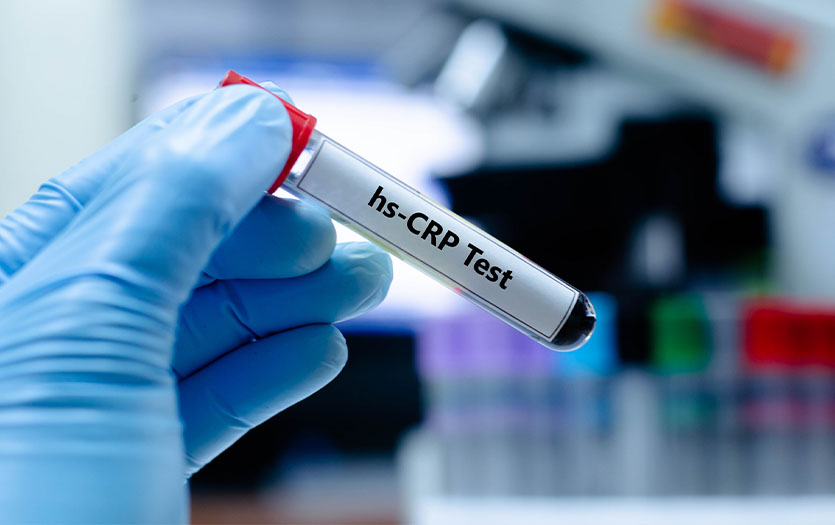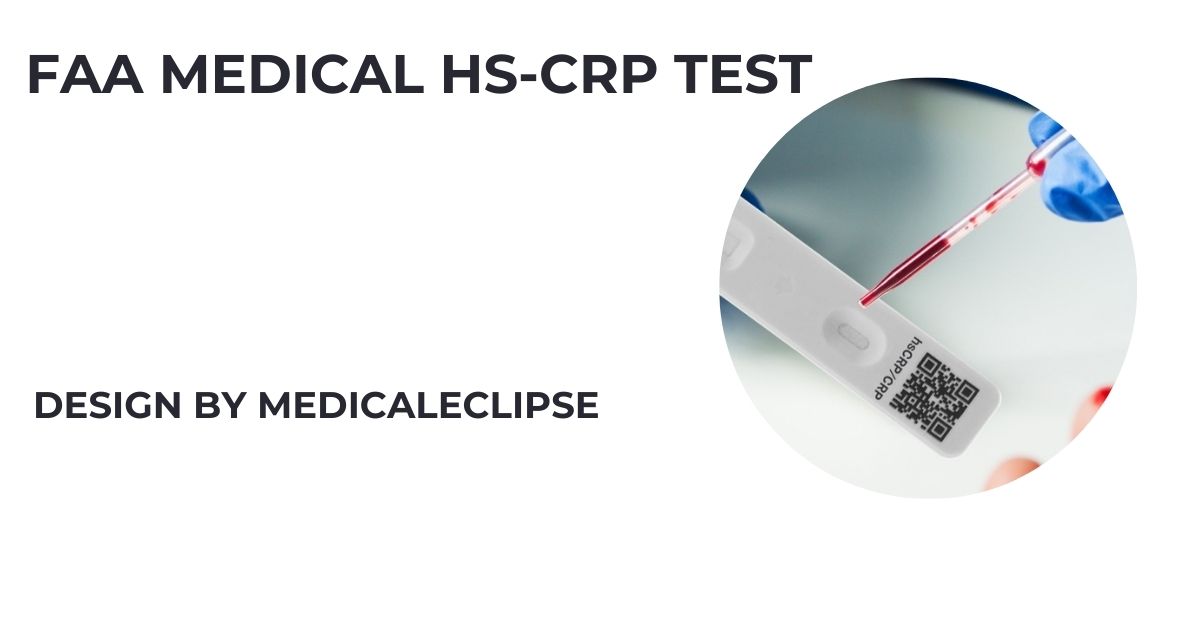The FAA medical hs-CRP test is becoming an essential part of aviation medical screenings. The Federal Aviation Administration (FAA) ensures that pilots meet strict health requirements to maintain safety in the skies.
In this guide, we’ll break down everything you need to know about the FAA medical hs-CRP test, including its purpose, how it affects your medical certification, and how to prepare for it.
What Is the FAA Medical hs-CRP Test?

The high-sensitivity C-reactive protein (hs-CRP) test is a blood test that detects low levels of inflammation in the body. It is more sensitive than a standard CRP test and is often used to assess heart disease risk.
The FAA may require pilots to take this test as part of their medical certification process, especially if they have a history of heart-related issues. Since cardiovascular health is a major concern in aviation, ensuring that pilots are free from significant heart risks is crucial.
Why Does the FAA Use the hs-CRP Test?
- Helps detect hidden inflammation that may contribute to heart disease.
- Supports early diagnosis of cardiovascular conditions.
- Ensures pilots meet the FAA’s strict health standards for flying.
Why Does the FAA Require hs-CRP Testing for Pilots?
The FAA is committed to ensuring that all pilots are physically fit to operate an aircraft. Cardiovascular disease is a leading cause of medical disqualifications, and the hs-CRP test provides valuable insights into heart health.
Key Reasons for FAA Medical hs-CRP Testing:
- Cardiovascular Risk Assessment: hs-CRP is linked to a higher risk of heart attacks and strokes.
- Aviation Safety: A pilot experiencing a cardiac event mid-flight could pose a significant safety risk.
- Regulatory Compliance: The FAA may require additional heart health tests for pilots with risk factors like high cholesterol, hypertension, or diabetes.
If your hs-CRP levels are high, it doesn’t automatically mean disqualification. However, it may lead to further medical evaluations.
Also Read: Aqreva Medical Billing Kaiser – Your Partner in Kaiser Billing!
How the hs-CRP Test Works?
The hs-CRP test is a simple blood test that measures the level of C-reactive protein (CRP) in your bloodstream. CRP is produced by the liver in response to inflammation.
Understanding Your hs-CRP Test Results:
| hs-CRP Level (mg/L) | Risk Category |
| < 1.0 | Low risk for heart disease |
| 1.0 – 3.0 | Moderate risk |
| > 3.0 | High risk |
High levels of hs-CRP may indicate:
- Chronic inflammation
- Increased cardiovascular risk
- Uncontrolled medical conditions
The FAA considers these results alongside other heart health markers before making a final decision on medical certification.
What Happens if Your hs-CRP Levels Are High?

If your hs-CRP levels exceed 3.0 mg/L, the FAA may request additional tests such as:
- Lipid panel (cholesterol check)
- Electrocardiogram (ECG)
- Echocardiogram
- Cardiac stress test
FAA Medical Certification Process for Elevated hs-CRP:
- Initial Test – If the FAA finds high hs-CRP levels, they may request further testing.
- Follow-Up Testing – Additional tests help determine if there is an underlying heart condition.
- Medical Review – The FAA’s aeromedical examiners will review your results.
- Decision – Depending on the findings, you may receive a medical certificate, be placed on a special issuance waiver, or face a temporary disqualification.
If you have high hs-CRP levels, improving your diet, exercise, and stress management can help lower inflammation and improve your overall heart health.
How to Prepare for the FAA Medical hs-CRP Test?
If you have an upcoming FAA medical exam, preparing for the hs-CRP test can improve your results.
Tips to Reduce hs-CRP Levels Before the Test:
- Maintain a Healthy Diet – Eat anti-inflammatory foods like leafy greens, berries, and omega-3-rich fish.
- Exercise Regularly – Moderate physical activity reduces inflammation and improves cardiovascular health.
- Get Enough Sleep – Poor sleep is linked to higher inflammation markers.
- Manage Stress – Chronic stress can elevate hs-CRP levels.
- Avoid Smoking and Excess Alcohol – Both can increase inflammation in the body.
Also Read: Lutheran Medical Center – Your Pathway to Quality Healthcare!
Common Conditions That May Affect hs-CRP Levels:
Several medical conditions can cause elevated hs-CRP levels, including:
- Obesity – Higher body fat increases inflammation.
- Diabetes – Poor blood sugar control can raise CRP levels.
- Autoimmune Diseases – Conditions like lupus or rheumatoid arthritis lead to chronic inflammation.
- Infections – Recent illnesses can temporarily elevate hs-CRP levels.
If your hs-CRP levels are high due to a temporary condition, inform your Aviation Medical Examiner (AME) and request a retest after recovery.
How to Maintain a Heart-Healthy Lifestyle as a Pilot?
Since cardiovascular health is crucial for pilots, adopting a heart-healthy lifestyle can help you maintain your medical certification.
Key Lifestyle Tips for Pilots:
- Eat a Balanced Diet – Prioritize whole foods over processed meals.
- Stay Hydrated – Dehydration can affect circulation and heart function.
- Exercise Regularly – Aim for at least 150 minutes of moderate exercise per week.
- Monitor Your Health – Regular check-ups help detect issues early.
- Manage Stress – Practice meditation, deep breathing, or mindfulness.
By making small, consistent lifestyle changes, you can improve your heart health and ensure you remain FAA-certified for years to come.
FAQ’s
1. Can medications affect my hs-CRP test results?
Yes, certain medications like statins, anti-inflammatory drugs, and corticosteroids can lower hs-CRP levels, while others, such as hormone replacement therapy, may increase them. Always inform your Aviation Medical Examiner (AME) about any medications you are taking.
2. How often do pilots need to take the hs-CRP test?
The FAA does not require hs-CRP testing for all pilots regularly. However, if you have a history of heart-related issues or elevated risk factors, the FAA may request periodic testing to monitor your cardiovascular health.
3. Can diet alone significantly lower hs-CRP levels?
Yes, adopting an anti-inflammatory diet rich in whole foods, omega-3 fatty acids, and antioxidants can help reduce hs-CRP levels over time. However, lifestyle changes like exercise and stress management are also essential.
4. Does the FAA consider hs-CRP levels when renewing medical certificates?
If a pilot previously had high hs-CRP levels, the FAA might request follow-up tests before approving a medical certificate renewal. The decision depends on overall health status and other cardiovascular risk factors.
5. Are there alternative tests to hs-CRP for assessing cardiovascular risk?
Yes, additional tests like coronary calcium scoring, lipid panels, and inflammatory markers (such as fibrinogen) can provide more insights into cardiovascular health. The FAA may request these tests alongside hs-CRP for a more comprehensive assessment.
Conclusion
The FAA medical hs-CRP test is an important tool for evaluating heart health in pilots. While a high result doesn’t mean automatic disqualification, it may require further medical evaluation. By maintaining a healthy lifestyle, you can lower your hs-CRP levels and improve your chances of passing the FAA medical exam.

Leave a Reply